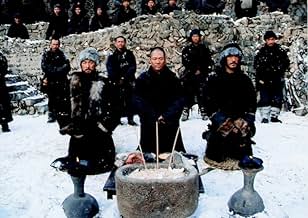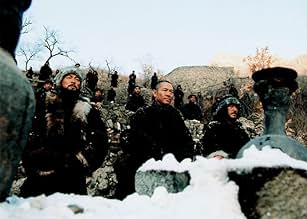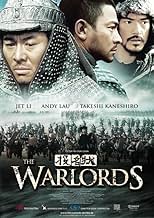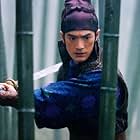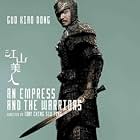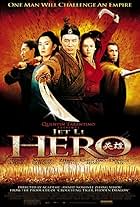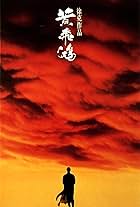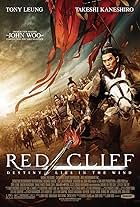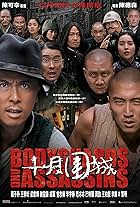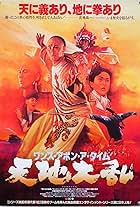China, 1860s: Having his army slaughtered, General Qingyun joins 2 bandit leaders in raids on rebels and in blood oath. They form a Qing loyal army with eyes on rebel held Suzhou and Nanjing... Read allChina, 1860s: Having his army slaughtered, General Qingyun joins 2 bandit leaders in raids on rebels and in blood oath. They form a Qing loyal army with eyes on rebel held Suzhou and Nanjing.China, 1860s: Having his army slaughtered, General Qingyun joins 2 bandit leaders in raids on rebels and in blood oath. They form a Qing loyal army with eyes on rebel held Suzhou and Nanjing.
- Awards
- 18 wins & 28 nominations
Jet Li
- General Pang Qingyun
- (as Lianjie Li)
Takeshi Kaneshiro
- Jiang Wuyang
- (as Wu Jincheng)
Xichao Wang
- Gouzi
- (as Yachao Wang)
Aaron C. Shang
- Duan Feng
- (as Aaron Shang)
Storyline
Did you know
- TriviaThe main battle sequence had a detailed script treatment of over 20 pages and a maximum of 8 cameras rolling simultaneously.
- GoofsDuring battles, the horses fall down without being hit. Clearly they were tripped by wire.
- Quotes
General Pang Qingyun: Remember my face, so you can seek vengeance in the next life.
- Alternate versionsThe UK version is cut by 16 secs to remove shots of cruel horsefalls.
- ConnectionsFeatured in Films of Fury: The Kung Fu Movie Movie (2011)
Featured review
I can certainly respect this Chinese production. After all, the battle sequences are huge, the action very real and the look of the film is top-notch. Yet, despite all this I have a few reservations that keep this from being a truly great film.
The first problem is that most non-Chinese will have no idea what's happening much of the time unless they research into the Taiping Rebellion FIRST. While there is a prologue that gives a bit of information, it is very scant--and leaves many, many unanswered questions that you can only understand if you have read up on this era in Chinese history. Some good examples are the significance of the crucifix necklace---the viewer will have no idea where it came from or why it's there. And, who were the rebels and why were they rebelling against the Qing empire? Most importantly, who were the good guys and who weren't? Interestingly enough, who is the hero and villain overall in this rebellion seems to vary over time. During Mao's reign, he felt that the Taiping rebels were the good guys as they represented the forces of socialism (with their redistribution of the land and equality). Today, the prevailing attitude in the country seems to be that the rebels were bad because they brought disunity. ALL of this might have been interesting to learn about in the film, but alas I learned none of this in "Warlords".
Second, while the battle sequences were amazing and I was glad that they didn't make war seem bloodless (oooh, it's VERY bloody in this film!!), the film occasionally suffered from over-kill, per se. In other words, with so many battles and so much killing, the senses are overloaded and the film manages in spite of all the brutality and severed limbs to actually bore--at least it did do with me.
But, despite these serious complaints, I DO recommend you see the film--provided you read up on the facts first. It's a particularly great film to see on the big screen or on a huge plasma TV. And, the plot involving the three blood brothers is pretty interesting and the acting very good. One final important reason to see the film for weirdo purists like me is that you CAN turn off the English-dubbed version and just watch it in Chinese with English subtitles--and I appreciate that option.
The first problem is that most non-Chinese will have no idea what's happening much of the time unless they research into the Taiping Rebellion FIRST. While there is a prologue that gives a bit of information, it is very scant--and leaves many, many unanswered questions that you can only understand if you have read up on this era in Chinese history. Some good examples are the significance of the crucifix necklace---the viewer will have no idea where it came from or why it's there. And, who were the rebels and why were they rebelling against the Qing empire? Most importantly, who were the good guys and who weren't? Interestingly enough, who is the hero and villain overall in this rebellion seems to vary over time. During Mao's reign, he felt that the Taiping rebels were the good guys as they represented the forces of socialism (with their redistribution of the land and equality). Today, the prevailing attitude in the country seems to be that the rebels were bad because they brought disunity. ALL of this might have been interesting to learn about in the film, but alas I learned none of this in "Warlords".
Second, while the battle sequences were amazing and I was glad that they didn't make war seem bloodless (oooh, it's VERY bloody in this film!!), the film occasionally suffered from over-kill, per se. In other words, with so many battles and so much killing, the senses are overloaded and the film manages in spite of all the brutality and severed limbs to actually bore--at least it did do with me.
But, despite these serious complaints, I DO recommend you see the film--provided you read up on the facts first. It's a particularly great film to see on the big screen or on a huge plasma TV. And, the plot involving the three blood brothers is pretty interesting and the acting very good. One final important reason to see the film for weirdo purists like me is that you CAN turn off the English-dubbed version and just watch it in Chinese with English subtitles--and I appreciate that option.
- planktonrules
- Jul 8, 2010
- Permalink
Details
- Release date
- Countries of origin
- Official sites
- Language
- Also known as
- Đầu Danh Trạng
- Filming locations
- Production companies
- See more company credits at IMDbPro
Box office
- Budget
- $40,000,000 (estimated)
- Gross US & Canada
- $129,078
- Opening weekend US & Canada
- $10,073
- Apr 4, 2010
- Gross worldwide
- $42,883,181
- Runtime2 hours 6 minutes
- Color
- Sound mix
- Aspect ratio
- 2.35 : 1
Contribute to this page
Suggest an edit or add missing content




